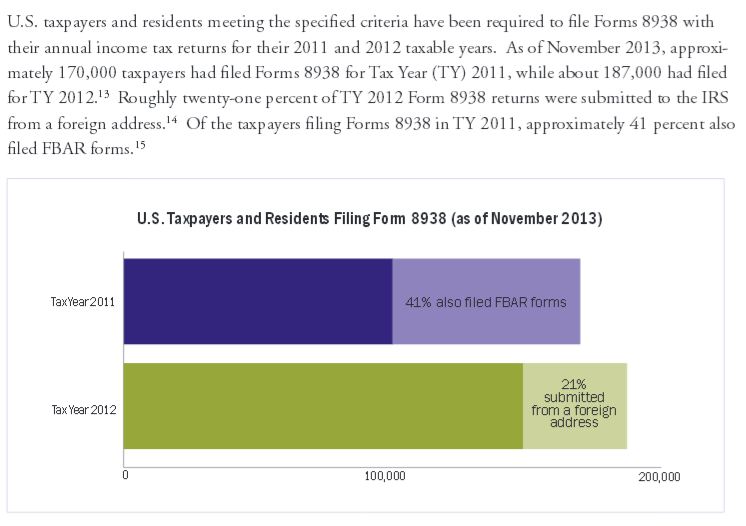A leading accounting firm is taking the unusual step of urging Canadians to double-check their citizenship status, warning there may still be thousands of accidental Americans in Canada oblivious to their U.S. tax obligations.
Although this article does not contain false information, it is primarily advertising for the IRS and tax compliance industry. The article contains a number of "half truths". The main point is that the FATCA problem applies to those who really are U.S. citizens.When it comes to U.S. citizenship: 1. Being born in the U.S. means you start life as a U.S. citizen but it is very possible that one has relinquished U.S. citizenship along the way. 2. Being born outside the U.S. does not carry any presumption of U.S. citizenship. The accountants, banks, insurance companies and most lawyers are NOT capable of advising you on your citizenship status. What they do is help you comply with U.S. tax laws and they are happy to do this whether you are a U.S. citizen or not.
1. Being born in the U.S. means you start life as a U.S. citizen but
it is very possible that one has relinquished U.S. citizenship along
the way.
2. Being born outside the U.S. does not carry any presumption of U.S. citizenship.
The accountants, banks, insurance companies and most lawyers are NOT capable of advising you on your citizenship status. What they do is help you comply with U.S. tax laws and they are happy to do this whether you are a U.S. citizen or not.
2. Being born outside the U.S. does not carry any presumption of U.S. citizenship.
The accountants, banks, insurance companies and most lawyers are NOT capable of advising you on your citizenship status. What they do is help you comply with U.S. tax laws and they are happy to do this whether you are a U.S. citizen or not.
The article contains a number of "half truths". The main point is that the FATCA problem applies to those who really are U.S. citizens.
When it comes to U.S. citizenship:
1. Being born in the U.S. means you start life as a U.S. citizen but it is very possible that one has relinquished U.S. citizenship along the way.
2. Being born outside the U.S. does not carry any presumption of U.S. citizenship.
The accountants, banks, insurance companies and most lawyers are NOT capable of advising you on your citizenship status. What they do is help you comply with U.S. tax laws and they are happy to do this whether you are a U.S. citizen or not.
1. Being born in
the U.S. means you start life as a U.S. citizen but it is very possible
that one has relinquished U.S. citizenship along the way.
Although this article does not contain false information, it is primarily advertising for the IRS and tax compliance industry.
The article contains a number of "half truths". The main point is that the FATCA problem applies to those who really are U.S. citizens.
When it comes to U.S. citizenship:
1. Being born in the U.S. means you start life as a U.S. citizen but it is very possible that one has relinquished U.S. citizenship along the way.
2. Being born outside the U.S. does not carry any presumption of U.S. citizenship.
The accountants, banks, insurance companies and most lawyers are NOT capable of advising you on your citizenship status. What they do is help you comply with U.S. tax laws and they are happy to do this whether you are a U.S. citizen or not.
The article contains a number of "half truths". The main point is that the FATCA problem applies to those who really are U.S. citizens.
When it comes to U.S. citizenship:
1. Being born in the U.S. means you start life as a U.S. citizen but it is very possible that one has relinquished U.S. citizenship along the way.
2. Being born outside the U.S. does not carry any presumption of U.S. citizenship.
The accountants, banks, insurance companies and most lawyers are NOT capable of advising you on your citizenship status. What they do is help you comply with U.S. tax laws and they are happy to do this whether you are a U.S. citizen or not.
Although this article does not contain false information, it is primarily advertising for the IRS and tax compliance industry.
The article contains a number of "half truths". The main point is that the FATCA problem applies to those who really are U.S. citizens.
When it comes to U.S. citizenship:
1. Being born in the U.S. means you start life as a U.S. citizen but it is very possible that one has relinquished U.S. citizenship along the way.
2. Being born outside the U.S. does not carry any presumption of U.S. citizenship.
The accountants, banks, insurance companies and most lawyers are NOT capable of advising you on your citizenship status. What they do is help you comply with U.S. tax laws and they are happy to do this whether you are a U.S. citizen or not.
http://www.theglobeandmail.com/report-on-business/are-you-an-accidental-american-pwc-alerts-customers-to-us-tax-obligations/article19832567/#dashboard/follows/
The article contains a number of "half truths". The main point is that the FATCA problem applies to those who really are U.S. citizens.
When it comes to U.S. citizenship:
1. Being born in the U.S. means you start life as a U.S. citizen but it is very possible that one has relinquished U.S. citizenship along the way.
2. Being born outside the U.S. does not carry any presumption of U.S. citizenship.
The accountants, banks, insurance companies and most lawyers are NOT capable of advising you on your citizenship status. What they do is help you comply with U.S. tax laws and they are happy to do this whether you are a U.S. citizen or not.


.jpg)



















